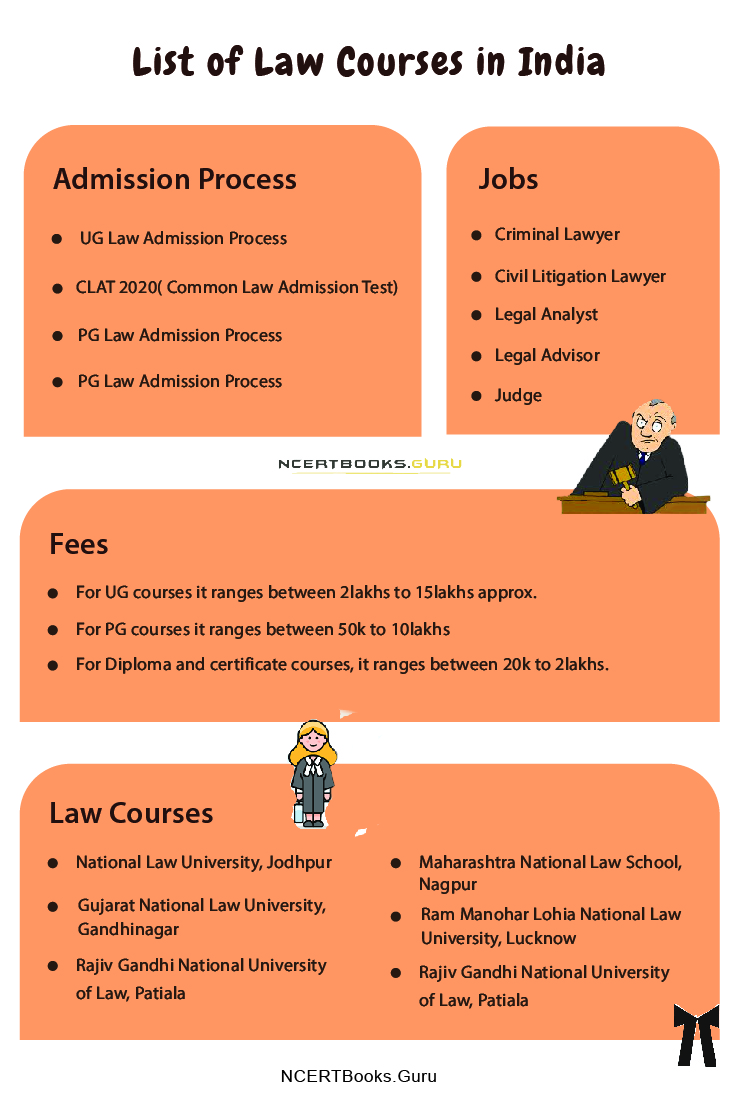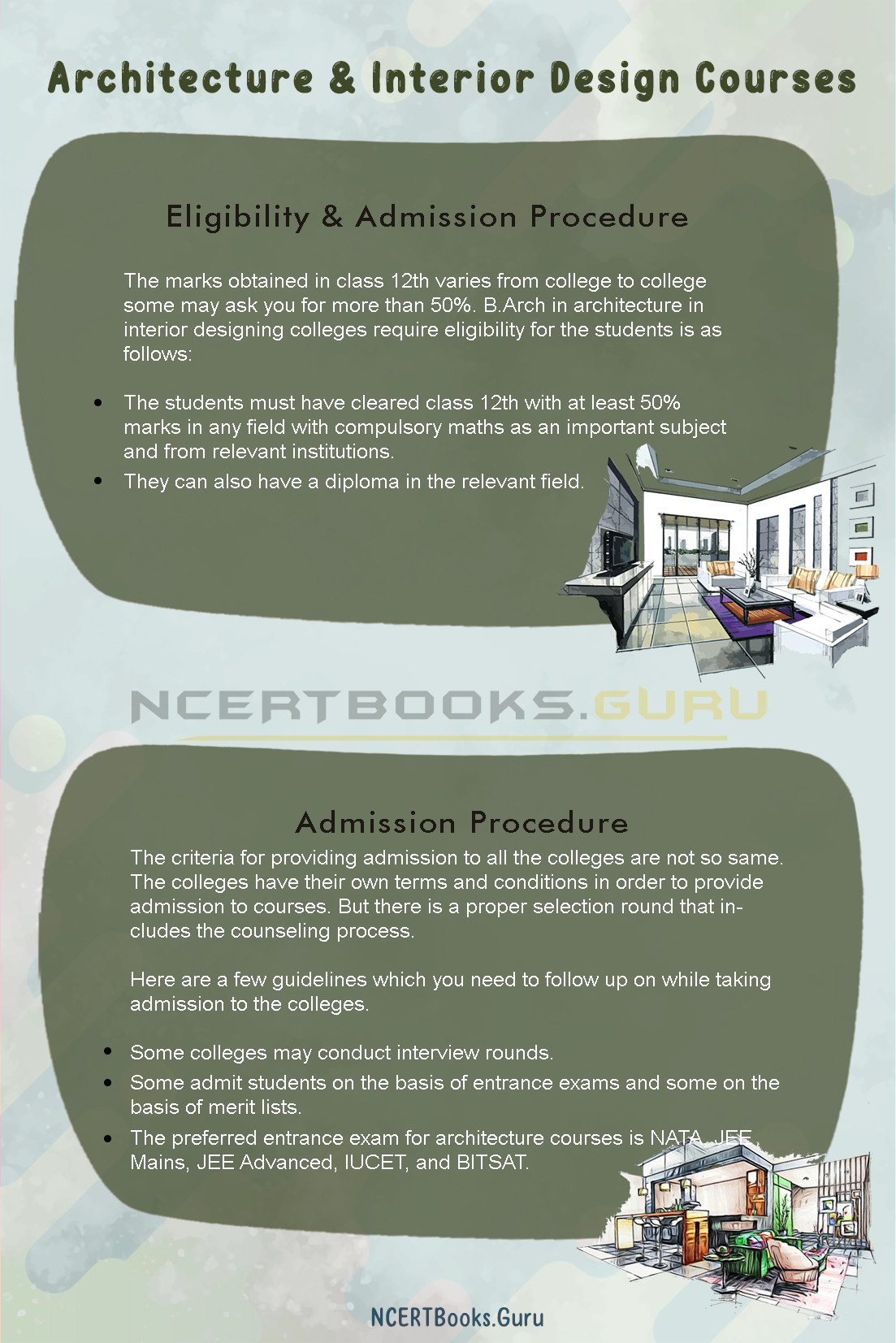List of Law Course in India: Law education is the most important need for the candidates who want to pursue and manage to complete the legal education and grab a prestigious post of Lawyer in society. The Law courses in India are popular among aspirants at both undergraduate and postgraduate levels. There are various law courses in India which include integrated, certificate, diploma, bachelor’s, masters and doctorate courses.
In our Indian society, the education of Law plays a magnificent role to urge awareness of its Right and Duties. A lawyer has a different perspective and degree of operations. A lawyer sometimes does a task of Advocate wherein another aspect they also operate as ‘solicitors’ as an advisor. A lawyer has a client with different problems. In many cases, a lawyer fights on behalf of clients.
Get to Know More about other types of Course Details in Stream wise, and Category wise.
- A Brief on Law Courses in India
- Details and Duration of Law Courses in India
- Admission Process and Eligibility Criteria for Law Courses in India
- Fee Structure of Law Courses in India
- List of Universities offering Law Courses in India
- Jobs Description of Lawyers
- Salary for Lawyers
- Top Recruiters
- Books & Study Material for Law Courses
- Who becomes a Lawyer?
- What are the various types of academic courses of Law in India?
- Which body regulates legal education in India?
- How to become a Judge?
- Is the CLAT entrance exam essential for admission in both UG and PG courses in Law?
- Conclusion on List of Law Courses in India
A Brief on Law Courses in India
The most interesting thing about law courses in India is that your career is not restricted to courtrooms and sessions but can find a good short of jobs. From a legal advisor to a corporate lawyer to an educationist, one can choose a career as per their interests and career plan. The course of Law is popular and offered among various government and private Colleges/Universities in India and at various academic levels. Candidates can opt consistently with his or her choices of study in various law courses after 12th like LL.B (Bachelor of legislative law), integrated LL.B, LL.M (Master of legislative law) and doctoral courses.
Traditionally, Law education in India is obtainable as three years of graduation degree. It’s structure change in the later in the year 1987. Again in 1961, The degree in Law accepted as an Advocate Act 1961. It is passed in parliament for both the aspect of legal education and also the regulation of legal work. Under this Act, the Bar Council of India is the supreme regulatory body to regulate the legal profession in India and maintenance of professional standards of the legal profession in the country.
The Bar Council of India also prescribes the minimum curriculum required to be taught for an institution to be eligible for the grant of a law degree. The Bar Council has work of supervision on the institutions which conferring the degree and also, evaluates their teaching methodology and curriculum and having determined that the institution meets the required standards, recognises the institution and the degree granted by them. The “Law Commission of India” decided to line up a University for Law Education to boost the tutorial standard of the legal profession in India in the year 1985.
After that, the first new law University in India got formed in Bangalore, which was named as the “National Law School of India University” commonly referred to as the “NLS”. That was the time when the first time LLB degree was started in India. LLB Course is an undergraduate degree that covers core specialisations and mainly focuses on legal code, jurisprudence, Constitutional/Administrative Law, Equity and Trusts, land Law, Tort Law and European law. There are quite 500 institutes in India teaching law. In September 2012, the UGC established the LLM one-year course in India.
Details and Duration of Law Courses in India
UG Law courses In India
There are various Law courses in India after completing senior secondary education. Some are bachelor degree and integrated UG Law courses, and few of them are bachelor in legislative law Courses. Law Courses after 12th comprises great exposure to candidates who are pursuing successful Carriers in Law.
Here, the list of some UG Law courses and their duration.
- Bachelor of Law (LL.B)- 3 year
- Bachelor of Legislative of Law (Honours)- 3 year
- Bachelor of Law in Intellectual Property Rights – 3year
- Bachelor of Business Administration & Bachelor of Legislative of Law Course (B.B.A.+ L.L.B)- 5 year
- Bachelor of Business Administration & Bachelor of Legislative of Law (Honours) [B.B.A. + L.L.B (Hons.)]- 5year
- Bachelor of Arts & Bachelor of Legislative of Law Course (B.A. + LL.B)-5 year
- Bachelor of Arts & Bachelor of Legislative of Law (Honours)[B.A.+L.L.B (Hons.)]- 5year
- Bachelor of Commerce & Bachelor of Legislative of Law Course (B.Com + L.L.B)- 5year
- Bachelor of Commerce & Bachelor of Legislative of Law (Honours) -5 year
- Bachelor of Socio-Legal Sciences & Bachelor of Law (B.S.L.+ L.L.B)-5 year
- Bachelor of Science & Bachelor of Legislative of Law (B.Sc + L.L.B)-5 year
PG Law Courses in India
To achieve the highest degree and Advance knowledge in the field of Law. There is an ample no of courses with a wide variety of choices for a candidate. Here are some list of PG courses with duration is given below:-
- Master of Law Course (LL.M)- 1/2 years
- Master of Legislative Law in Business Law [L.L.M. (Business Law)]
- Master of Law in Constitutional Law & Administrative Law
- Master of Legislative Law in Constitutional Law[L.L.M. (Constitutional Law)]
- Master of Law in Corporate and Financial Law[L.L.M. (Corporate and Securities Law)]
- Master of Law in Criminal Law [L.L.M. (Criminal Law)]
- Master of Law in Criminal Law and Criminology (L.L.M. Criminal Law and Criminology )
- Master of Law in Energy Laws (L.L.M. Energy Laws )
- Master of Law in Human Rights (L.L.M. Human Rights)
- Master of Law in International Law, Constitutional Law and Human Rights
- Master of Law in Intellectual Property Rights
- Master of Law in International Environmental Rights
- Master of Law in International Trade Law
- Master of Law in Labour Law and Administrative Law
- Master of Law in Corporate Law (L.L.M. Corporate Law)
- Master of Law in Labour Law (L.L.M. Labour Law)
- L.L.M. (Mercantile Law) – Master of Law in Mercantile Law
- Master of Legislative Law Honours [L.L.M. (Hons.)]
- Master of Business Law (M.A. Business Law)
- Master of Criminal Justice (M.A. Criminal Justice)
- Master of Anti-Terrorism Laws (M.A. Anti-Terrorism Laws)
- Master of Criminology and Criminal Justice (M.A. Criminology and Criminal Justice)
- Master of Public Policy Law and Governance (M.A. Public Policy Law and Governance)
- Master of Science in Intellectual Property Rights (M.Sc Intellectual Property Rights)
- Master of Cyber Law and Information Technology (M.C.L.I.T)
- Master in business law (MBL)- 1/2 year
PG in Law or LLM is the master’s degree in legal education with the options consist of one or two-year duration. Another MBA+ LLM or MBL-LLM is an integrated course with a duration of a 3-year degree program after achieving a bachelor’s degree.
Diploma Law Courses in India
Some diploma courses are taking a short time as compared to a bachelor’s or associated courses. Here list of some sector’s or diploma courses like :
- Corporate Laws & Management
- Co-operative Law
- Cyber Law
- Human Rights
- Information Technology Laws
- Labour Laws
- Labour Laws & Labour Welfare
- International Laws
- Taxation Laws
- Women Studies & Gender Justice
- Criminal Law
- Business Law
Certificate Law Courses in India
There is some certificate program to enhance knowledge in the field of law in a very short time. Here some example of certificate program offering field names are:
- Cyber Law Course
- Business Law
- Corporate Law Course
- Anti-Human Trafficking
- Insurance Law
- Human Rights
- Consumer Protection
Doctor of Philosophy (Ph.D.) Courses in India
After doing the LLM program or PG in Law the desirous candidate can choose their carriers to achieve more knowledge of legal aspects, they are willing to continue with a great zeal for PhD post the completion of legal education.

Admission Process and Eligibility Criteria for Law Courses in India
- UG Law Admission Process: Desirous candidates can pursue UG law courses with any stream (Science stream/ Commerce stream / Arts stream) in 12th. Candidates who want to get admission in Law, They must have to give and clear the cutoff of
- CLAT 2020( Common Law Admission Test): CLAT is organised by National Law Universities (NLUS) and various other institutions.
- PG Law Admission Process: Desirous candidates must have completed their bachelor’s degree in law. Students who are desirous of taking law courses from foreign Universities/institutions can apply for LSAT 2020.
Candidates are required to give the entrance examination and clear the cutoff of entrance test like:
- CLAT 2020
- AILET 2020
- AP LAWCET 2020
- TS LAWCET 2020
- DU LLB 2020
- MH CET Law 2020
- IPU CET Law 2020
- Allahabad University (LAT) 2020
Also, Check
Admission for granting Certificate of practice
Bar council of India offering the candidates who want to practise in the field of law. They must have completed his LL.B. And also must be qualified in the All India Bar Examination (AIBE 2020).
Fee Structure of Law Courses in India
Fees vary from institution to institution and also course to course. It also depends on the body of institutions like private or government.
- For UG courses it ranges between 2lakhs to 15lakhs approx.
- For PG courses it ranges between 50k to 10lakhs
- For Diploma and certificate courses, it ranges between 20k to 2lakhs.
List of Universities offering Law Courses in India
Here, the list of some top listed Universities is stated below:
- The West Bengal National University of Juridical Sciences, Kolkata
- National Law University, Jodhpur, Jodhpur
- Gujarat National Law University, Gandhinagar
- Rajiv Gandhi National University of Law, Patiala
- Ram Manohar Lohia National Law University, Lucknow
- Hidayatullah National Law University, Raipur
- National University of Advanced Legal Studies, Kochi
- Chanakya National Law University, Patna
- National Law University Odisha
- National Law University, Delhi, New Delhi
- Damodaram Sanjivayya National Law
- University, Visakhapatnam
- National University of Study and Research in Law, Ranchi Jharkhand
- National Law School and Judicial Academy, Assam, Guwahati
- Tamil Nadu National Law School, Srirangam
- Maharashtra National Law School, Nagpur
Jobs Description of Lawyers
In India, there has been an enormous demand for expert lawyers. According to a recent survey done by the Bar Council of India, There is only 20% of the Indian law students are eligible to work in court. Freshers would have to work under a reputed legal firm or lawyer during the start of their career. Also, if you are a law student, then you can be a public prosecutor, solicitor general or a part of private legal firms after getting some experience. You can also give the exam conducted by the Public Service Commissions and become a Judge.
Today, Lawyers are also work in the Ministry, government departments and various other legal organizations.
Here are some of the designations of lawyers:
- Criminal Lawyer
- Civil Litigation Lawyer
- Legal Analyst
- Document Drafting Lawyer
- Legal Journalist
- Legal Advisor
- Government Lawyer
- Judge
Salary for Lawyers
There is no fixed salary in this profession and also absolutely no limit if you are a good lawyer and practising individually.
But once the course is complete, while you are working under the experts, you can earn around Rs. 5000 to 20000 per month as a stipend.
While when you start working individually in the court, you can earn around Rs. 20000 to 50000 per month at the start.
Top Recruiters
- Amarchand Mangaldas
- AZB & Partners
- J Sagar Associates
- Khaitan & Co
- Luthra & Luthra
- Trilegal
- Desai & Diwanji
- Singhania & Partners
- Titus & Co
- Wadia Ghandy & Co
- Lakshmi Kumaran & Sridharan
- Economic Laws Practice
- Vaish & Associates
Books & Study Material for Law Courses
Here are some law book list available especially for undergraduate, postgraduate and doctoral level law courses.
- Intro to the Constitution of India by D.D. Basu
- Public Administration by M Laxmikanth
- Indian Constitutional Law by M.P. Jain
- Criminal Law – Incorporating the legal code (Amendment) Act, 2013 by P.S.A. Pillai.
- Manual of Labour Laws by Waseem Ahmad Qureshi
- Development of the concept of Human Rights Under the law of nations by Dr. Vijay Chitnis
- Private Security and therefore the Law by Charles Nameth
FAQ’s on List of Law Courses in India
Question 1.
Who becomes a Lawyer?
Answer:
To become a ‘Lawyer’ The Education of Law is the most important for the candidates who are truly interested and can grab a prestigious post of Lawyer in society.
Question 2.
What are the various types of academic courses of Law in India?
Answer:
The various types of law courses in India included integrated, certificate, diploma, bachelor’s, masters and doctorate courses.
Question 3.
Which body regulates legal education in India?
Answer:
Legal Education in India is regulated by the Bar Council of India, a statutory body established under the advocate’s Act of 1961. The Bar Council of India is the only body that approved any institutions for legal education in India.
Question 4.
How to become a Judge?
Answer:
A law student, who works as a public prosecutor, solicitor general or a part of private legal firms after getting some experience. They can give the exam conducted by the Public Service Commissions and become a Judge.
Question 5.
Is the CLAT entrance exam essential for admission in both UG and PG courses in Law?
Answer:
Yes, The common law admission test is essential to qualify for taking admission in both UG and PG courses in Law.
Conclusion on List of Law Courses in India
We know, The carrier option in Law is quite respected and reputed. It is a reliable and sincere field. After learning and developing knowledge in any above-mentioned courses could lift you to the stairs of success and open the doors of better career opportunities. All you need is learning cordially and patiently.










